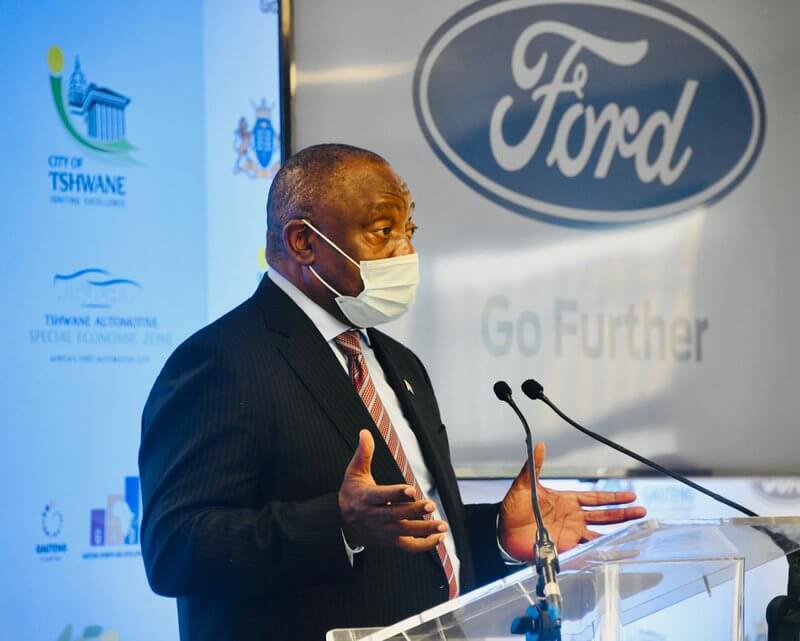
SA President Cyril Ramaphosa Acknowledges R15.8 Billion Investment by Ford
President Cyril Ramaphosa has hailed the R15.8 billion investment by Ford Motor Company to modernise its Silverton assembly plant and create 1 200 jobs despite the impact of the Covid-19 pandemic on the economy.
He was visiting the facility with Trade, Industry and Competition Minister Ebrahim Patel, Gauteng Premier David Makhura and Tshwane Executive Mayor Randall Williams.
The next-generation Ford Ranger will be manufactured at the plant from 2022.
Ford International Markets group director of operations Andrea Cavallaro told the president and delegates from both the private and public sector this was the biggest investment in the carmaker’s 97-year history in South Africa. It represented one of the largest ever investments in the South African automotive industry, boosting Ford’s production capability and creating the 1 200 new jobs at the plant and an estimated 10 000 new jobs across the company’s local supplier network.
Ford’s Silverton plant was expected to generate revenues exceeding 1.1% of South Africa’s GDP with this investment.
The annual capacity at the plant would increase to 200 000 vehicles from 168 000, supporting production of the Ford Ranger bakkie for the domestic market and export to more than 100 global markets.
Cavallaro showed Ramaphosa, Makhura and Randall a 3D concept of the plant that would also manufacture Volkswagen trucks as part of the company’s strategic alliance with the German motor company.
“It is great to see the progress that has been made despite the massive challenges posed by the Covid-19 pandemic. This development presents a perfect opportunity to use our country’s comparative and competitive advantages to accelerate industrialisation,” Ramaphosa said.
“These advantages include a well-developed automotive industry with advanced manufacturing capabilities, an appropriately skilled workforce and access to growing markets.
He said countries like Malaysia, China and Singapore demonstrated the potential of special economic zones when they managed to place their economies on sustainable industrial paths.
“In our own experience, special economic zones have proven to be an effective tool to enhance our productive capacity.
Ramaphosa said that since its inception in 2014, the Special Economic Zones programme had attracted R18.6bn in private investment from 136 operational companies.
An additional 99 investment by companies, worth R48bn, was being considered.
He said the programme was playing a significant role in supporting the implementation of the country’s Economic Reconstruction and Recovery Plan that was launched in October last year in response to the impact of the pandemic.
“With construction having started in August 2020 within the limits of the Covid-19 regulations, the planning, design and construction work has to date delivered significant jobs, training and development to both the communities and SMMEs in the region.
“Out of the 34 targeted infrastructure work packages reserved for local SMMEs, 22 have been successfully executed with a value of R170m. More will be rolled out as the Special Economic Zone commences with the construction of the top structures.
“Through the development of this infrastructure, which is supported by the Department of Trade, Industry and Competition to an estimated value of R3.15bn over the next three years, we will see the creation of an expected 2 000 direct manufacturing jobs.
“The total short-term jobs to be created during the construction phase is estimated at about 8 600.”
Ramaphosa said the City of Tshwane and the Gauteng Department of Economic Development had committed R288m and R200m respectively towards enabling bulk infrastructure development for this project.
Silverton will become one of the first Ford plants globally to achieve “Island Mode” status, becoming entirely energy self-sufficient and carbon neutral by 2024.

